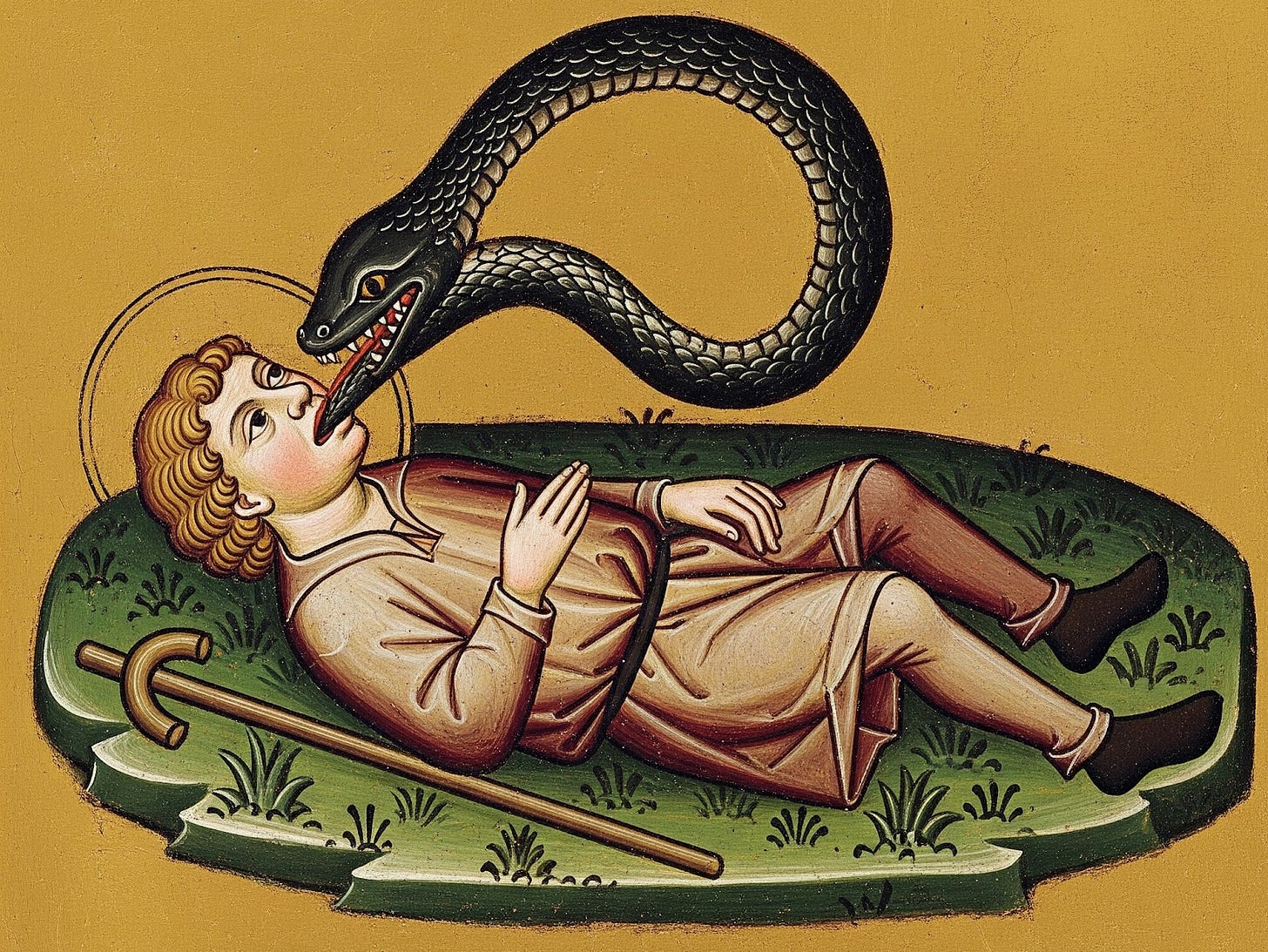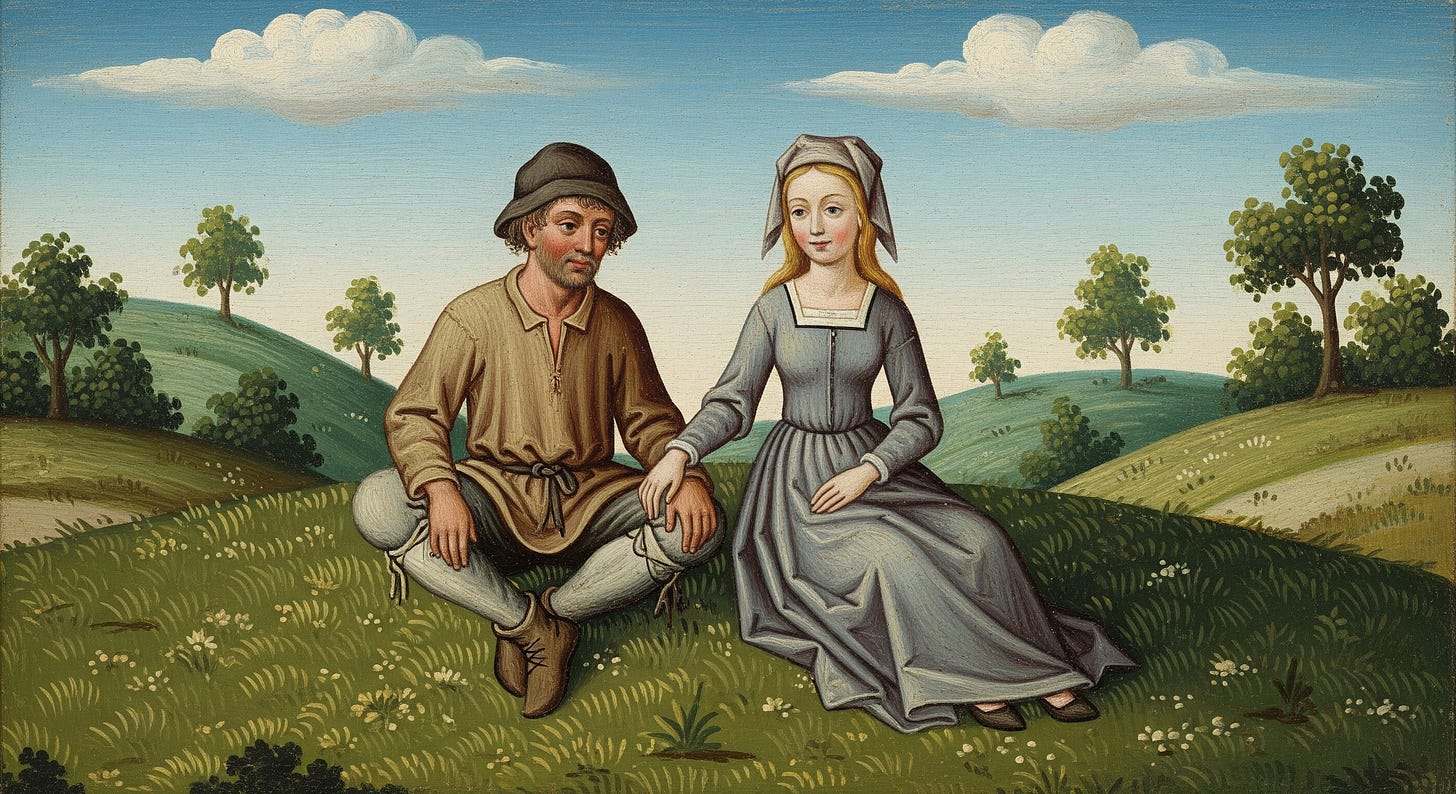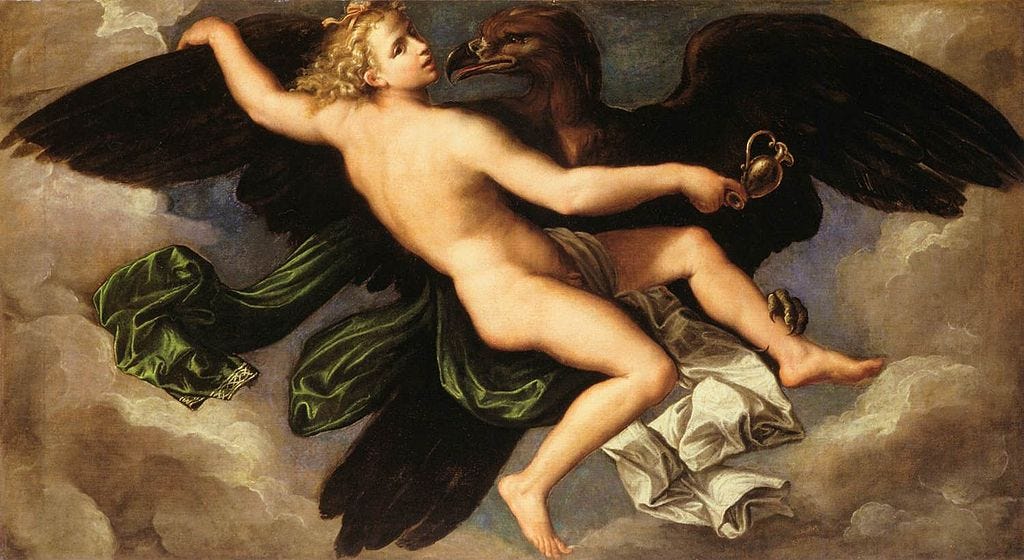Carl Jung: Why Being Simple Is the Best Thing We Can Do for Ourselves
Be simple like the stupid Michel.
In the previous chapter, the prophet Zarathustra confronted a dwarf called the spirit of gravity. In that same chapter, after facing the dwarf, an important vision appears that is very useful to analyze. The prophet Zarathustra says:
“Truly, I had never seen anything like what I saw then: a young shepherd boy writhed on the ground, unable to breathe and convulsing; his face was distorted, and from his mouth hung a large black serpent.”
As is usual, Carl Jung is interested in this vision and its symbolism. He thus describes the shepherd as a symbol in contrast to Zarathustra: Zarathustra would be “the great figure,” the leader of men, while the shepherd would be the small figure, the leader of the sheep.
This symbol functions as a sort of compensation for Zarathustra’s grandiloquence; it reveals the simplicity and plainness that surround the man Nietzsche in real life, outside his books, and it also compensates for the strong influence of Zarathustra. Meanwhile, the black serpent would represent the cerebrospinal system — the central nervous system — the libido, the energy that drove and possessed what Nietzsche expressed in his works (his mouth).
The interpretation above is personal, borrowing somewhat from what Jung said on the matter. But it is as if that vision showed Nietzsche that he was possessed and tormented by the very libido that compelled him to express himself. He was probably enchanted, identified with, and possessed by what he expressed in Thus Spoke Zarathustra. For that reason, Jung said:
“Most people cannot bear simplicity. There are many simple and modest individuals who would be fine if they could be who they are, but they believe they should be something better, that they are not quite good enough; and so they begin to deck themselves out with feathers and whatnot to be great and astonishing. But they are only astonishing when they are simple.”
Far from telling us we should have no dreams or ambitions, Carl Jung invites us not to identify with our great ideals. He preaches an attitude found in Eastern philosophies as well: simply being and remaining in our reality and present moment, with what we are and what we are not.
It is not complacency; it is an invitation to ground ourselves in our reality. If we identify only with future possibilities, we become defined by—and trapped in—those possibilities. And that is one of the problems of intuition.
Let us live in the present moment, in the simplicity of what we are, and let that be balanced by something great rather than the other way around. If we identify with great things, if we believe ourselves to be greater than where we are now, we will be trapped in illusion.
Let us be like Dumme Michel (the “stupid Michel”)
Later Jung says:
“If we arrive at the stage where we are not even the dumme Michel, where we are less than a simpleton, then we can use a great word without the devil attacking us. But to the extent that we feel we are something, the devil will attack us.”
Dumme Michel is a folkloric figure in Germany, from a popular tale, and the name essentially means “stupid Michel.” It refers to the story of a very simple man who, upon releasing a fish he had unintentionally trapped in a bucket of water, was promised that his wishes would be granted. But Michel only wished that the princess of his kingdom would become pregnant — what simplicity!
Dumme Michel is an innocent figure without a great need to be someone important; therefore, at first his only wish was that the princess become pregnant, and he remained a peasant. Nothing changed until his son grew up and sought to investigate his father, offering a great banquet to the whole kingdom.
When he was discovered and thrown into the sea on the king’s orders inside a glass globe, together with the princess and the son, he wished to reach an island and save their lives. After that wish was granted, as always, he wished for a castle and servants.
This story and Jung’s comment do not allude to making vows of poverty in the style of St. Francis of Assisi; they rather show a state in which we do not identify with anything, since we have no need to be something: neither great nor small. We simply are and live everything.
For that reason Jung says that insofar as “we are something,” the devil will attack us — that is, insofar as we seek to possess and identify with what we desire, do, or think, with our virtues, defects, and personality, we become victims of our shadows.
By contrast, if we allow ourselves not to be any of that and give ourselves the chance to live our fullness without seeking to possess anything for our identity. We will find that we are already in the midst of the very things we long to possess. We will then discover our authenticity — who we truly are. And if we are humble enough not to identify with it, then we can indeed express a great word to the world that comes from our heart, one that is genuine and honest, free from delusions of grandeur.
If man is surpassed, there will be no man left
We conclude with Jung’s following words and the analysis that follows:
“So a tenor should beware that he is not his voice, just as a painter should beware that he is not his brush, and an intelligent man should know that he is not identical with his mind, lest the gift slip away with the man. For every gift is a demon that can seize a man and carry him away. That is why in Antiquity they represented a man’s genius as a winged being or even as a bird of prey that can carry the individual away, like the famous abduction of Ganymede.”
Here Jung emphasizes an important point: gifts (talents, intellect, inspiration) are not extensions of the self; they were not created by us (at most, they are developed), but are autonomous entities that, if confused with personal identity, can “seize” and “carry away” the individual from himself, leading to inflation, dissociation, or even madness.
In this way, Nietzsche’s vision shows the man Nietzsche his simplicity, and at the same time that he is not his Superman nor Zarathustra. He is certainly not his philosophy, nor his great intellect or genius. He is urged to be as simple as the shepherd of his vision and to free himself from the black serpent.
This underscores Jung’s warning against ego inflation, where the individual identifies with archetypal contents, believing himself to be “more than human.” This is why Jung replies to Nietzsche’s famous phrase “Man is something that must be surpassed” with:
If man is surpassed, there will be no man left.
Finally, remember that in ancient Rome the genius was a personal tutelary spirit, often winged (like an angel or daimon), symbolizing creative inspiration. The “bird of prey” alludes to the eagle, a symbol of Zeus in Greek mythology. The “abduction of Ganymede” refers to the myth in which Zeus, in the form of an eagle, abducts the youth Ganymede to take him to Olympus as cupbearer of the gods — a divine elevation, but also a forced removal from earthly life, symbolizing ecstasy or possession.
Remember: I’ve committed myself to deeply studying all of Jung’s work and also to freely sharing what I learn, so my content will always be free. But if you’d like to support my project, I’d gladly accept a coffee:
I also recommend that you read my following publications:
Source of quotations:
Thus Spoke Zarathustra, Part III, chapter “On the Vision and the Riddle.”
Notes from the seminar on Thus Spoke Zarathustra given in 1934–1939 by Carl Jung, Spring Term, SESSION V, June 8, 1938.





"If we allow ourselves...the chance to live our fullness without seeking to possess anything for our identity. We will find that we are already in the midst of the very things we long to possess," is my favorite quote from all the posts you've written.
Humble would be better than simple but maybe it was lost or conflated in translation. Many high performers talk of being 'in the zone' not consciously present or just being a conduit. The word Inspiration is derived from spiritus the devine breath that is breathed into us - all aludes to not coming from within but from without so to claim credit is to lie which invokes a sin.